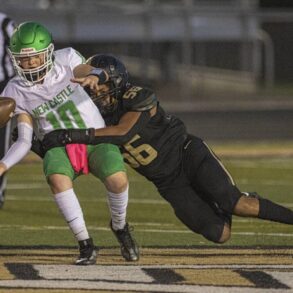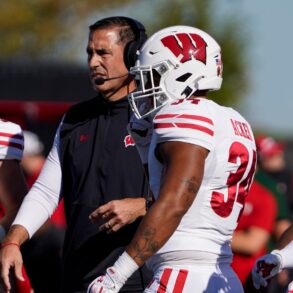
Drastic situations call for drastic measures.
College football has been thrust from the before-times, where concepts like “amateurism,” “program loyalty” and “The AP Poll” reigned supreme, into the glitz and glamour of modernity. Quarterbacks driving lamborghinis, riding private jets and outfitting their teammates in diamonds?
Regulation is one of those things that becomes obvious when excess is apparent, and the signs are hard to ignore. Beyond the glut of NIL money that the NCAA has little to no power to regulate, the conference structure — the foundation of the entire athletic system — has been carved up in Darwinian fashion.
The Pac-12, which had existed in some form for over a century, was ripped apart as most programs jumped to larger TV contracts with the Big Ten and Big 12. Stanford and Cal, suddenly out in the cold, signed up with the Atlantic Coast Conference. Does it matter that both schools are 2,500 miles away from the Atlantic Coast? No — the new paradigm says get on board or get left behind.
We are in an unusual predicament. This is not just a problem of enforcing the rules, the problem is the rules are being made up as we go. Lines need to be drawn, and right now there is no one with the authority to draw the lines.
It was in this vain that at his press conference before the Fiesta Bowl, Penn State head coach James Franklin said “one of the most important things we can do is [to] get a commissioner of college football that is waking up every single morning and going to bed every single night making decisions that’s in the best interest of college football.”
I couldn’t agree more. Commissioners are introduced in times of crisis. Major League Baseball started the trend in 1920, elevating federal judge Kenesaw Mountain Landis amid allegations that eight stars of the Chicago White Sox had fixed the previous World Series. His first act was to ban all of them for life. There’s nothing that sensational here, but college football’s current track is nevertheless dire.
Take star Wisconsin freshman cornerback Xavier Lucas as just one painful example.
The Badgers are suing Lucas for allegedly violating a two-year NIL contract after he jumped ship to Miami this offseason, saying they have “credible evidence” the Hurricanes “tampered” with him. There is a plethora of gray area here that shows the value of having an authoritative voice.
What is the nature of NIL contracts? Are they closer to professional sport contracts or celebrity endorsements? Where can this money come from? Are there limits on the amounts schools can spend? What about boosters? How can these contracts be enforced? Additionally, what constitutes tampering? Are there punishments that can be handed out to violators?
Some of these questions judges are trying to answer, but until they do — and potentially even if they do — wealthy programs will gobble up stars in the meantime.
The obvious next question is “Who?” Coach Franklin was quick to suggest former Alabama legend Nick Saban, who was quick to say he didn’t want it. Who is less important now — there is certainly a talented lawyer or executive eager to manage the sport millions of Americans love. They must be able to handle the big egos of the conference commissioners and enforce rules that may not always be popular. But most of all, they need to be a singular voice passionately arguing for the virtues of the game.
Enjoy what you’re reading? Get content from The Daily Cardinal delivered to your inbox
Legend says players and owners alike would “quake” when they were called to Commissioner Landis’ office. Doesn’t college football deserve a figure like that? Someone who is willing to stand up for the aspects that make the sport great — and different from the professional game. Tradition and school spirit won’t fight that battle alone, they need a representative. They need a commissioner.
Graham Brown is a member of The Cardinal’s editorial board and former opinion editor. He is a senior studying political science and history. Do you think college football needs a commissioner? Send all comments to opinion@dailycardinal.com
The Daily Cardinal has been covering the University and Madison community since 1892. Please consider giving today.
Graham Brown is a former opinions editor for The Daily Cardinal.
This post was originally published on this site be sure to check out more of their content.









